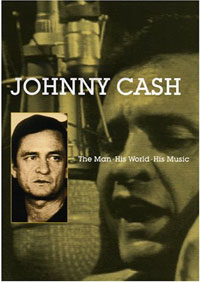[One] striking moment in the film is concert footage of Cash’s performance of songs from his Bitter Tears album at a 1968 Sioux Indian reservation concert in South Dakota. This footage illustrates Cash’s activism for Native American land rights and also the difficulties of navigating fame and power differentials between the singer and his listeners. At the concert, one of many where he performed to raise money for Native American tribes, Cash smoked a peace pipe, Sioux men and women performed traditional dances and songs, and he told his audience “Let’s have the house lights turned up so we can look each other in the eye and tell it like it really was.” The unequal power relationship between him and his audience is obvious—they do not have his degree of agency and cultural access to be able to “tell it like it really was”, but Cash’s commitment to and engagement with this audience is serious. The documentary covers Cash’s trip to Wounded Knee, where a Sioux chief asked him to write a song about the 1890 massacre, and we see him composing the song, “Big Foot”, which decries the slaughter.


No comments:
Post a Comment